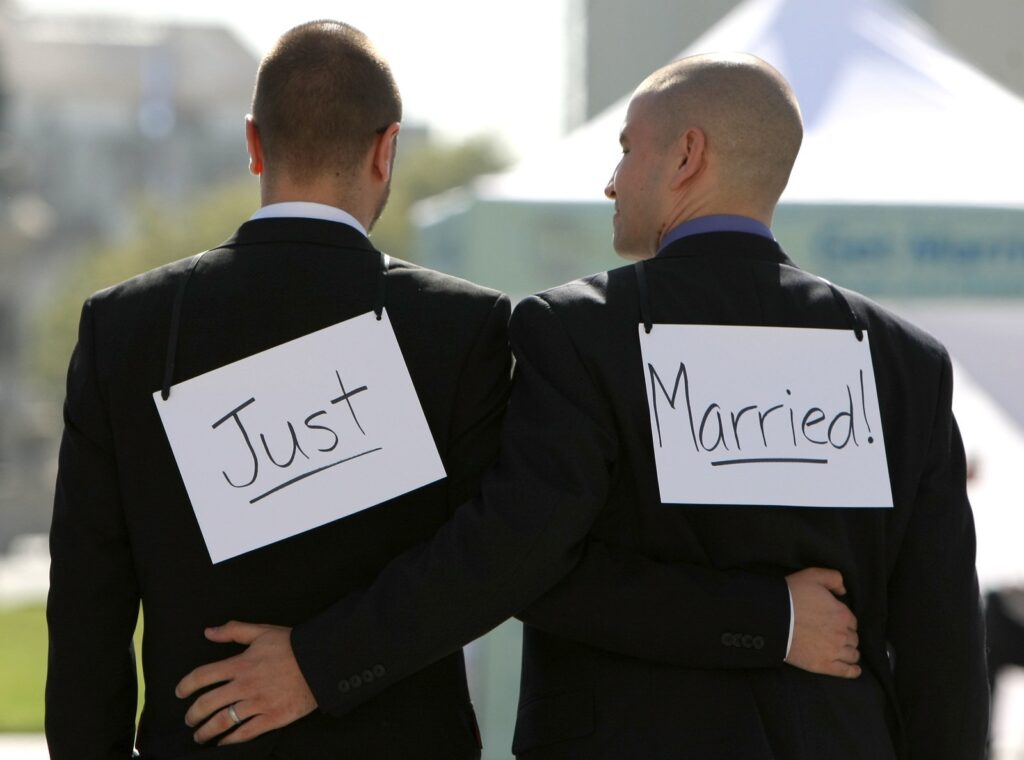

In the tapestry of modern social reform, the legalization of gay marriage in the UK stands out as a vibrant thread woven with struggles, victories, and ceaseless courage. It’s a narrative that mirrors the depths of dark love and the heights of profound devotion found in the most compelling gay love stories. This journey not only reshaped laws but also the lives of countless individuals who longed for recognition and equality under the law. So, when was gay marriage legalized in the UK? Let’s unfold the chapters of this transformative era.
Historical Context
The Early Days
Long before the bells rang for wedding vows among same-sex couples, the UK’s stance on gay rights was starkly conservative. Homosexuality was decriminalized in England and Wales in 1967, but it took several more decades of advocacy, setbacks, and small victories to pave the way for marriage equality.
The Road to Legalization


A Gradual Awakening
The journey to gay marriage legalization in the UK was neither swift nor straightforward. It was a path marked by societal shifts, legal battles, and a changing global perspective that increasingly favored human rights irrespective of gender or sexual orientation.
Major Milestones
Key Legislative Changes
Civil Partnership Act 2004: This act was the first legal recognition of relationships between same-sex couples, allowing them similar rights to those of married heterosexual couples, albeit not termed as “marriage.”
Marriage (Same Sex Couples) Act 2013: Finally, in July 2013, gay marriage was legalized in England and Wales, marking a historic and joyous victory for the LGBTQ+ community.
Impact on Society
A New Chapter Begins
The legalization of gay marriage in the UK had a profound impact on society. It challenged existing norms, encouraged inclusivity, and recognized love in all its forms, setting a precedent for future legislation and acceptance.
Personal Stories


Lives Changed
Behind the statutes and legal language are the heartfelt stories of couples who longed to see their love acknowledged by the law. These narratives not only humanize the legal facts but also add a rich, personal texture to the discourse on gay marriage.
Comparison with Other Countries
A Global View
While the UK celebrated its milestone, it joined a list of countries that were also rewriting their laws on marriage. This comparison not only highlights different legislative timelines but also the varying cultural and societal contexts in which these changes occurred.
Cultural Reception
Society Embraces Change
The acceptance of gay marriage marked a significant cultural shift in the UK. From literature to films, the portrayal of LGBTQ+ characters and themes became more mainstream and widely accepted.
Challenges and Controversies
Ongoing Issues
Despite the progress, the road to equality continues to face challenges. Issues such as religious freedoms, discrimination laws, and societal acceptance still prompt heated debates and legal scrutiny.
The Role of Activism
Driving Change Through Advocacy
Activists played a crucial role in the legalization of gay marriage. Through protests, lobbying, and public education, they created a formidable force that propelled the legislative changes.
Legal and Social Implications
Beyond Just Marriage
The legalization of gay marriage also affected various aspects of law and society, including adoption rights, inheritance, and social acceptance, further integrating the LGBTQ+ community into the societal fabric.
Future Prospects
The Journey Ahead
While significant strides have been made, the journey towards full equality and acceptance continues. Future prospects include tackling discrimination in all forms and ensuring that legal gains are upheld and advanced.
How the Law Came to Be
The Legal Framework
Understanding the specific legal amendments, the parliamentary debates, and the public consultations that led to the legalization of gay marriage provides insight into the democratic process and the complexity of enacting social change.
Key Figures and Advocates
Champions of Change
Highlighting the politicians, activists, and celebrities who advocated for gay marriage rights not only personalizes the story but also illustrates the diverse support network that influenced public opinion and policy.
Literature and Media Influence
Reflecting Society’s Pulse
The impact of literature and media in shaping public opinion and conveying the struggles and triumphs of the LGBTQ+ community has been profound and continues to inspire and educate.
FAQs
1. When was gay marriage legalized in the UK?
Gay marriage was legalized in England and Wales on July 17, 2013, and later in Scotland in December 2014.
2. What was the first legal recognition of same-sex couples in the UK?
The first legal recognition came with the Civil Partnership Act in December 2004.
3. How did UK’s gay marriage law compare to other countries?
The UK was not the first to legalize gay marriage but was among the pioneers in Europe, following countries like the Netherlands and Belgium.
4. What were some major challenges faced in legalizing gay marriage?
Major challenges included opposition from religious groups, political inertia, and a broadly conservative public sentiment at the time.
5. What implications does gay marriage legalization have on society?
It broadens the scope of human rights, challenges existing social norms, and promotes a more inclusive and equitable society.
The legalization of gay marriage in the UK is more than just a legal milestone; it’s a vibrant chapter in the ongoing story of love, rights, and acceptance in human society. Each stride made on this path not only reflects the changing contours of legal frameworks but also the enduring spirit of love that transcends all boundaries. This chapter, so beautifully akin to the profound narratives found in romantic and dark love stories, continues to inspire and educate, reminding us of the power of love and the importance of equality.
